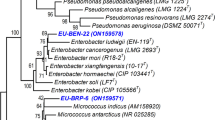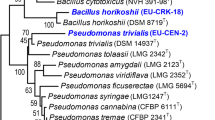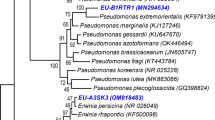Abstract
Intensive agricultural practices with chemical fertilizers are becoming the reason of environmental deterioration. To feed the ever increasing worldwide population with sustainability goals is a one major challenge and biostimulants developed from the beneficial soil and plant microbiome is a better approach for farming practices to increase the crop productivity. In agricultural fields various categories of biostimulants are utilized that contains one microbial culture and multiple strains of microbes in single formulation as microbial consortium. The mixture of microbial species in a formulation is an emerging technology in the present era because of its multiple benefits for plant growth and plant protection for agro-environment sustainability. The present study deals with the isolation of rhizospheric and endophytic bacteria from different cereal and pseudocereal crops and development of a single inoculum as well as consortium for the cereal crops growth. A total of 147 bacteria (rhizospheric and endophytic) were sorted out and were screened for plant growth promoting attributes of nitrogen fixation, phosphorus and potassium solubilization. Among all the bacterial isolates, three potential strains EU-PEN-6, EU-PRP-12 and EU-PRK-4 exhibiting N-fixing, P and K-solubilizing attributes were identified using 16S rRNA gene sequencing as Pseudomonas extremorientalis, Bacillus subtilis, and Bacillus amyloliquefaciens, respectively. In best of our knowledge, the present investigation has firstly reported P. extremorientalis, B. subtilis and B. amyloliquefaciens associated with the endophytic region of wheat and rhizosphere of pearl millet. The strains inoculation on pearl millet as single culture and as bacterial consortium improved the parameters like length and biomass of root/shoot, chlorophyll, carotenoids, total soluble sugar content, phenolics, and flavonoids over untreated control. The bacterial consortium was found to have more potential over single culture inoculation. A bacterial consortium could be used as bioinoculants for cereal crops growing in hilly regions.



Similar content being viewed by others
Data availability
Not applicable.
Abbreviations
- BLAST:
-
Basic Local Alignment Search Tool
- CFU:
-
Colony forming unit
- gDNA:
-
Genomic DNA
- K:
-
Potassium
- LSD:
-
Least significant difference
- N:
-
Nitrogen
- NA:
-
Nutrient agar
- NCBI:
-
National Center for Biotechnology Information
- OD:
-
Optical density
- P:
-
Phosphorus
- PGP:
-
Plant growth promoting
References
Ahmad I, Ahmad M, Hussain A, Jamil M (2021) Integrated use of phosphate-solubilizing Bacillus subtilis strain IA6 and zinc-solubilizing Bacillus sp. strain IA16: a promising approach for improving cotton growth. Folia Microbiol 66:115–125. https://doi.org/10.1007/s12223-020-00831-3
Behera B, Das TK, Raj R, Ghosh S, Raza MB, Sen S (2021) Microbial consortia for sustaining productivity of non-legume crops: prospects and challenges. Agric Res 10:1–14. https://doi.org/10.1007/s40003-020-00482-3
Brenner K, Karig DK, Weiss R, Arnold FH (2007) Engineered bidirectional communication mediates a consensus in a microbial biofilm consortium. Proc Natl Acad Sci 104:17300–17304. https://doi.org/10.1073/pnas.0704256104
Cao Y, Zhang Z, Ling N, Yuan Y, Zheng X, Shen B et al (2011) Bacillus subtilis SQR 9 can control Fusarium wilt in cucumber by colonizing plant roots. Biol Fert Soils 47:495–506. https://doi.org/10.1007/s00374-011-0556-2
Conn VM, Franco CM (2004) Effect of microbial inoculants on the indigenous actinobacterial endophyte population in the roots of wheat as determined by terminal restriction fragment length polymorphism. Appl Environ Microbiol 70:6407–6413. https://doi.org/10.1128/AEM.70.11.6407-6413.2004
Cui W, He P, Munir S, He P, Li X, Li Y et al (2019) Efficacy of plant growth promoting bacteria bacillus amyloliquefaciens B9601-Y2 for biocontrol of southern corn leaf blight. Biol Control 139:104080. https://doi.org/10.1016/j.biocontrol.2019.104080
Devi R, Kaur T, Kour D, Yadav A, Yadav AN, Suman A et al (2022a) Minerals solubilizing and mobilizing microbiomes: a sustainable approaches for managing minerals deficiency in agricultural soil. J Appl Microbiol 133:1245–1272. https://doi.org/10.1111/jam.15627
Devi R, Kaur T, Kour D, Yadav AN (2022b) Microbial consortium of mineral solubilizing and nitrogen fixing bacteria for plant growth promotion of amaranth (Amaranthus hypochondrius L.). Biocatal Agric Biotechnol 43:102404. https://doi.org/10.1016/j.bcab.2022.102404
Devi R, Kaur T, Kour D, Yadav AN, Suman A (2022c) Potential applications of mineral solubilizing rhizospheric and nitrogen fixing endophytic bacteria as microbial consortium for the growth promotion of chilli (Capsicum annum L.). Biologia 77:2933–2943. https://doi.org/10.1007/s11756-022-01127-2
Egamberdieva D (2011) Survival of Pseudomonas extremorientalis TSAU20 and P. chlororaphis TSAU13 in the rhizosphere of common bean (Phaseolus vulgaris) under saline conditions. Plant Soil Environ 57:122–127. https://doi.org/10.17221/316/2010-PSE
Egamberdieva D, Berg G, Lindström K, Räsänen LA (2010) Co-inoculation of Pseudomonas spp. with Rhizobium improves growth and symbiotic performance of fodder galega (Galega orientalis Lam.). Euro J Soil Biol 46:269–272. https://doi.org/10.1016/j.ejsobi.2010.01.005
Egamberdieva D, Kucharova Z (2009) Selection for root colonising bacteria stimulating wheat growth in saline soils. Biol Fert Soils 45:563–571. https://doi.org/10.1007/s00374-009-0366-y
Han SO, New PB (1998) Variation in nitrogen fixing ability among natural isolates of Azospirillum. Microb Ecol 36:193–201. https://doi.org/10.1007/s002489900106
Horrigan L, Lawrence RS, Walker P (2002) How sustainable agriculture can address the environmental and human health harms of industrial agriculture. Environ Health Perspect 110:445–456. https://doi.org/10.1289/ehp.02110445
Hu X, Chen J, Guo J (2006) Two phosphate- and potassium-solubilizing bacteria isolated from Tianmu Mountain, Zhejiang, China. World J Microbiol Biotechnol 22:983–990. https://doi.org/10.1007/s11274-006-9144-2
Irigoyen J, Einerich D, Sánchez-Díaz M (1992) Water stress induced changes in concentrations of proline and total soluble sugars in nodulated alfalfa (Medicago sativa) plants. Physiol Plant 84:55–60. https://doi.org/10.1111/j.1399-3054.1992.tb08764.x
Jain A, Singh A, Chaudhary A, Singh S, Singh HB (2014) Modulation of nutritional and antioxidant potential of seeds and pericarp of pea pods treated with microbial consortium. Food Res Int 64:275–282. https://doi.org/10.1016/j.foodres.2014.06.033
Jain A, Singh A, Singh S, Singh HB (2015) Biological management of Sclerotinia sclerotiorum in pea using plant growth promoting microbial consortium. J Basic Microbiol 55:961–972. https://doi.org/10.1002/jobm.201400628
Jha CK, Saraf M (2012) Evaluation of multispecies plant-growth-promoting consortia for the growth promotion of Jatropha curcas L. J Plant Growth Regul 31:588–598. https://doi.org/10.1007/s00344-012-9269-5
Kaur T, Devi R, Kour D, Yadav A, Yadav AN (2021a) Plant growth promotion of barley (Hordeum vulgare L.) by potassium solubilizing bacteria with multifarious plant growth promoting attributes. Plant Sci Today 8 (sp1):17-24, https://doi.org/10.14719/pst.1377
Kaur T, Devi R, Kour D, Yadav A, Yadav AN, Dikilitas M et al (2021b) Plant growth promoting soil microbiomes and their potential implications for agricultural and environmental sustainability. Biologia 76:2687–2709. https://doi.org/10.1007/s11756-021-00806-w
Kaur T, Devi R, Kumar S, Sheikh I, Kour D, Yadav AN (2022) Microbial consortium with nitrogen fixing and mineral solubilizing attributes for growth of barley (Hordeum vulgare L.). Heliyon 8:e09326. https://doi.org/10.1016/j.heliyon.2022.e09326
Kim DO, Jeong SW, Lee CY (2003) Antioxidant capacity of phenolic phytochemicals from various cultivars of plums. Food Chem 81:321–326. https://doi.org/10.1016/S0308-8146(02)00423-5
Kumar A, Maurya BR, Raghuwanshi R (2021) The microbial consortium of indigenous rhizobacteria improving plant health, yield and nutrient content in wheat (Triticum aestivum). J Plant Nutr 44:1942–1956. https://doi.org/10.1080/01904167.2021.1884706
Kumar SM, Chowdappa P, Krishna V (2015) Development of seed coating formulation using consortium of Bacillus subtilis OTPB1 and Trichoderma harzianum OTPB3 for plant growth promotion and induction of systemic resistance in field and horticultural crops. Indian Phytopath 68:25–31
Kushwaha P, Kashyap PL, Kuppusamy P, Srivastava AK, Tiwari RK (2020a) Functional characterization of endophytic bacilli from pearl millet (Pennisetum glaucum) and their possible role in multiple stress tolerance. Plant Biosyst 154:503–514. https://doi.org/10.1080/11263504.2019.1651773
Kushwaha P, Kashyap PL, Srivastava AK, Tiwari RK (2020b) Plant growth promoting and antifungal activity in endophytic Bacillus strains from pearl millet (Pennisetum glaucum). Braz J Microbiol 51:229–241. https://doi.org/10.1007/s42770-019-00172-5
Lichtenthaler HK (1987) Chlorophylls and carotenoids: Pigments of photosynthetic biomembranes. In: Packer L, Douce R (eds) Methods in Enzymology, vol 148. Academic Press, pp 350–382. https://doi.org/10.1016/0076-6879(87)48036-1
Maheswar NU, Sathiyavani G (2012) Solubilization of phosphate by Bacillus spp. from groundnut rhizosphere (Arachis hypogaea L). J Chem Pharm Res 4:4007–4011
Mehta P, Walia A, Chauhan A, Kulshrestha S, Shirkot C (2013) Phosphate solubilisation and plant growth promoting potential by stress tolerant Bacillus sp. isolated from rhizosphere of apple orchards in trans himalayan region of Himachal Pradesh. Ann Appl Biol 163:430–443. https://doi.org/10.1111/aab.12077
Mir AA, Sadat MA, Amin MR, Islam MN (2019) Plant growth regulators: one of the techniques of enhancing growth and yield of Bangladeshi local cucumber variety (Cucumis sativus). Plant Sci Today 6 (2):252-258, https://doi.org/10.14719/pst.2019.6.2.534
Mondal S, Halder SK, Yadav AN, Mondal KC (2020) Microbial consortium with multifunctional plant growth-promoting attributes: future perspective in agriculture. In: Yadav AN, Rastegari AA, Yadav N, Kour D (eds) Advances in plant microbiome and sustainable agriculture: functional annotation and future challenges. Springer Singapore, Singapore, pp 219–258. https://doi.org/10.1007/978-981-15-3204-7_10
Murphy J, Riley JP (1962) A modified single solution method for the determination of phosphate in natural waters. Anal Chim Acta 27:31–36. https://doi.org/10.1016/S0003-2670(00)88444-5
Negi R, Kaur T, Devi R, Kour D, Sheikh I, Tyagi V et al (2022) First report on Rahnella sp. strain EU-A3SNfb, a plant growth promoting endophytic bacterium from wild wheat relative Aegilops kotschyi. Natl Acad Sci Lett 45:393–396. https://doi.org/10.1007/s40009-022-01139-1
Pan D, Mionetto A, Tiscornia S, Bettucci L (2015) Endophytic bacteria from wheat grain as biocontrol agents of Fusarium graminearum and deoxynivalenol production in wheat. Mycotoxin Res 31:137–143. https://doi.org/10.1007/s12550-015-0224-8
Panwar M, Tewari R, Nayyar H (2014) Microbial consortium of plant growth-promoting rhizobacteria improves the performance of plants growing in stressed soils: an overview. In: Khan MS, Zaidi A, Musarrat J (eds) Phosphate solubilizing microorganisms: principles and application of microphos technology. Springer, Cham, pp 257–285. https://doi.org/10.1007/978-3-319-08216-5_11
Park YS, Jung ST, Kang SG, Heo BG, Arancibia-Avila P, Toledo F et al (2008) Antioxidants and proteins in ethylene-treated kiwifruits. Food Chem 107:640–648. https://doi.org/10.1016/j.foodchem.2007.08.070
Patni B, Panwar A, Negi P, Joshi GK (2018) Plant growth promoting traits of psychrotolerant bacteria: A boon for agriculture in hilly terrains. Plant Sci Today 5 (1):24-28, https://doi.org/10.14719/pst.2018.5.1.352
Pellegrini M, Spera DM, Ercole C, Del Gallo M (2021) Allium cepa L. inoculation with a consortium of plant growth-promoting bacteria: effects on plants, soil, and the autochthonous microbial community. Microorganisms 9:639. https://doi.org/10.3390/microorganisms9030639
Pikovskaya R (1948) Mobilization of phosphorus in soil in connection with vital activity of some microbial species. Mikrobiologiya 17:362–370. https://doi.org/10.1016/S0048-9697(03)00262-6
Pretty J (2008) Agricultural sustainability: concepts, principles and evidence. Philos Trans R Soc B Biol Sci 363:447–465. https://doi.org/10.1098/rstb.2007.2163
Rajasekar S, Elango R (2011) Effect of microbial consortium on plant growth and improvement of alkaloid content in Withania somnifera (Ashwagandha). Curr Bot 2:27–30
Shen H, He X, Liu Y, Chen Y, Tang J, Guo T (2016) A complex inoculant of N2-fixing, P-and K-solubilizing bacteria from a purple soil improves the growth of kiwifruit (Actinidia chinensis) plantlets. Front Microbiol 7:841. https://doi.org/10.3389/fmicb.2016.00841
Siebrecht N (2020) Sustainable agriculture and its implementation gap—overcoming obstacles to implementation. Sustainability 12:3853. https://doi.org/10.3390/su12093853
Singh A, Jain A, Sarma BK, Upadhyay RS, Singh HB (2014) Rhizosphere competent microbial consortium mediates rapid changes in phenolic profiles in chickpea during Sclerotium rolfsii infection. Microbiol Res 169:353–360. https://doi.org/10.1016/j.micres.2013.09.014
Sugumaran P, Janarthanam B (2007) Solubilization of potassium containing minerals by bacteria and their effect on plant growth. World J Agric Sci 3:350–355
Sylia AB, Corrêa A, Cruz C, Yadav AN, Nabti E (2021) Plant growth promoting microbes as biofertilizers: Promising solutions for sustainable agriculture under climate change associated abiotic stresses. Plant Sci Today 8 (sp1):60-76, https://doi.org/10.14719/pst.1608
Tamura K, Dudley J, Nei M, Kumar S (2007) MEGA4: Molecular Evolutionary Genetics Analysis (MEGA) Software Version 4.0. Mol Biol Evol 24:1596–1599. https://doi.org/10.1093/molbev/msm092
Theoduloz C, Vega A, Salazar M, Gonzalez E, Meza-Basso L (2003) Expression of a Bacillus thuringiensis δ‐endotoxin cry1Ab gene in Bacillus subtilis and Bacillus licheniformis strains that naturally colonize the phylloplane of tomato plants (Lycopersicon esculentum, Mills). J Appl Microbiol 94:375–381. https://doi.org/10.1046/j.1365-2672.2003.01840.x
Verma JP, Jaiswal DK, Krishna R, Prakash S, Yadav J, Singh V (2018) Characterization and screening of thermophilic Bacillus strains for developing plant growth promoting consortium from hot spring of Leh and Ladakh region of India. Front Microbiol 9:1293. https://doi.org/10.3389/fmicb.2018.01293
Verma P, Yadav AN, Kazy SK, Saxena AK, Suman A (2013) Elucidating the diversity and plant growth promoting attributes of wheat (Triticum aestivum) associated acidotolerant bacteria from southern hills zone of India. Natl J Life Sci 10:219–227
Verma P, Yadav AN, Kazy SK, Saxena AK, Suman A (2014) Evaluating the diversity and phylogeny of plant growth promoting bacteria associated with wheat (Triticum aestivum) growing in central zone of India. Int J Curr Microbiol Appl Sci 3:432–447
Verma P, Yadav AN, Khannam KS, Panjiar N, Kumar S, Saxena AK et al (2015) Assessment of genetic diversity and plant growth promoting attributes of psychrotolerant bacteria allied with wheat (Triticum aestivum) from the northern hills zone of India. Ann Microbiol 65:1885–1899. https://doi.org/10.1007/s13213-014-1027-4
Xia M, Chakraborty R, Terry N, Singh RP, Fu D (2020) Promotion of saltgrass growth in a saline petroleum hydrocarbons contaminated soil using a plant growth promoting bacterial consortium. Int Biodeterior Biodegrad 146:104808
Xu J, Wang H, Zhu Z, Ji F, Yin X, Hong Q et al (2016) Isolation and characterization of Bacillus amyloliquefaciens ZDS-1: exploring the degradation of zearalenone by Bacillus spp. Food Control 68:244–250. https://doi.org/10.1016/j.foodcont.2016.03.030
Xu S, Wang Y, Hu J, Chen X, Qiu Y, Shi J et al (2021) Isolation and characterization of Bacillus amyloliquefaciens MQ01, a bifunctional biocontrol bacterium with antagonistic activity against Fusarium graminearum and biodegradation capacity of zearalenone. Food Control 130:108259. https://doi.org/10.1016/j.foodcont.2021.108259
Yadav AN, Sachan SG, Verma P, Tyagi SP, Kaushik R, Saxena AK (2015) Culturable diversity and functional annotation of psychrotrophic bacteria from cold desert of Leh Ladakh (India). World J Microbiol Biotechnol 31:95–108. https://doi.org/10.1007/s11274-014-1768-z
Yadav AN, Kour D, Ahluwalia AS (2021) Soil and phytomicrobiomes for plant growth and soil fertility. Plant Sci Today 8 (sp1):1-5, https://doi.org/10.14719/pst.1523
Yu X, Liu X, Zhu T-H, Liu G-H, Mao C (2012) Co-inoculation with phosphate-solubilzing and nitrogen-fixing bacteria on solubilization of rock phosphate and their effect on growth promotion and nutrient uptake by walnut. Euro J Soil Biol 50:112–117. https://doi.org/10.1016/j.ejsobi.2012.01.004
Zhang L-N, Wang D-C, Hu Q, Dai X-Q, Xie Y-S, Li Q et al (2019) Consortium of plant growth-promoting rhizobacteria strains suppresses sweet pepper disease by altering the rhizosphere microbiota. Front Microbiol 10:1668. https://doi.org/10.3389/fmicb.2019.01668
Funding
This study was funded by Department of Biotechnology, Dr. Khem Singh Gill Akal College of Agriculture, Eternal University, Baru Sahib and Department of Environment, Science & Technology (DEST), Shimla, HP funded project “Development of microbial consortium as bio-inoculants for drought and low temperature growing crops for organic farming in Himachal Pradesh”.
Author information
Authors and Affiliations
Contributions
Tanvir Kaur, and Rubee Devi compile the manuscript; Sunil Kumar and Divjot Kour read and review the manuscript and Ajar Nath Yadav hypothesized the manuscript.
Corresponding author
Ethics declarations
Conflict of interest
There are no conflicts of interest.
Additional information
Publisher’s note
Springer Nature remains neutral with regard to jurisdictional claims in published maps and institutional affiliations.
Rights and permissions
Springer Nature or its licensor (e.g. a society or other partner) holds exclusive rights to this article under a publishing agreement with the author(s) or other rightsholder(s); author self-archiving of the accepted manuscript version of this article is solely governed by the terms of such publishing agreement and applicable law.
About this article
Cite this article
Kaur, T., Devi, R., Kumar, S. et al. Plant growth promotion of pearl millet (Pennisetum glaucum L.) by novel bacterial consortium with multifunctional attributes. Biologia 78, 621–631 (2023). https://doi.org/10.1007/s11756-022-01291-5
Received:
Accepted:
Published:
Issue Date:
DOI: https://doi.org/10.1007/s11756-022-01291-5




